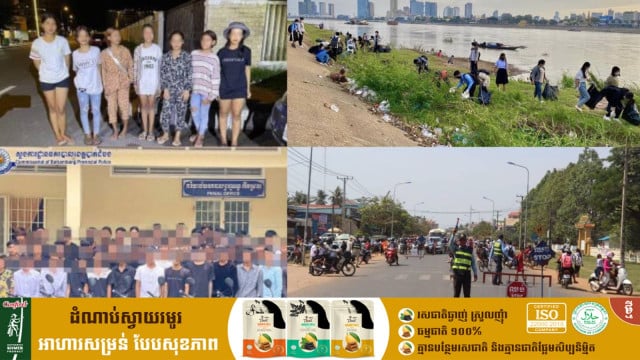Public Call on Community Service Sentences for Petty Crime

- By Meng Seavmey
- and Po Sakun
- September 19, 2023 10:59 AM
PHNOM PENH – People who commit an offense or a misdemeanor should be assigned to do community service instead of serving their sentence in jail. It could be a way to help offenders change their public behavior and find their spot in society, people say.
Community service could include cleaning or helping fix the roads, restoring or unblocking drains, working in nursery homes or orphanages, and picking up trash at public sites.
Thach Sothon, a papaya salad seller, wants the government to adapt the law so that petty crimes can be punished by community service, as their sentence can be beneficial to society.
“When they do community service, we can also make them wear a shirt that says ‘I will not do it again’. I believe that they will be ashamed and will not violate the law again,” the 40-year-old seller said.
Likewise, Chom Channit, an employee of a travel agency, believes that these new types of conviction could also provide an additional workforce to the social sector, which is often understaffed.
“The community service will teach them more practical work through helpful activities. They may realize that society is wider than what they've heard of,” Channit said. “It may look bad at first that the young people have to do such activities for their wrongdoings, but it will teach them that there will always be consequences for their actions.”
Offenders, Channit continued, may reflect on themselves that they have the strength and workforce to contribute to society although they are young and do not have the budget for charity.
Such a push for community service comes on the heels of a rise in petty crime throughout Cambodia. Since mid-2023, an increasing number of groups of youngsters have caused chaos in the country’s cities and rural areas.
Videos shared on social media show them being engaged in violent fights in public spaces, stealing, or destroying people’s property.
Hour Phavin, a finance operations officer at a bank, agrees that community service can not only help these people understand they acted wrong but also show the public they can be helpful to society.
“It’s like giving them a second chance, hoping community service will change themselves. By doing so, troublemakers can see they can do more than only cause trouble or put society in chaos,” Phavin said.
As of now, community service sentences don’t exist in Cambodian law, which only includes fines or prison sentences, depending on the gravity of the crime
“But there should be a discussion on the issue,” said Pa Chanroeun, president of the Cambodian Institute for Democracy (CID), adding that it doesn’t have to be a new law, but could come in the form of an additional article in the existing Village-Commune Safety Policy.
“In some countries, there is also a policy that encourages young offenders to do community service as their punishment, and the result is quite positive for them after the evaluation,” he said.
Turning a problem into an opportunity
The young violators can do helpful activities at schools, health centers, or pagodas. Even helping children cross the roads during peak hours can also be considered community service, Chanroeun added.
“To me, it is an act of turning a problem into an opportunity. The institutions that are interested in taking part in the method can study the possibility and discuss with relevant parties to see if the method will be effective if implemented.”
CID’s President suggested the duration of the community service should depend on the offense committed. For example, a one-month punishment for a minor violation, three months for a moderate offense, and six months or more for a more severe one.
While such a new type of conviction could have benefits, it would require public authorities to track the activities of anyone sentenced to community service, to be sure they complete their sentence. The length of the punishment could be extended if they do not obey the rules.
Soeng Sen Karuna, a senior investigator for the rights group ADHOC, said several factors should be considered before applying such a method. Relevant stakeholders will have to determine what types of offenses will be subject to community service, the institutions or units responsible for the assignment, the budget and the resources available for its implementation.
But while community service might change the mindset of some of those young people, others might cause more trouble for the relevant stakeholders responsible for their assignment, Karuna said.
“The problem involves many young people, and the method may change only some offenders. However, some other people who do not change will cause even more trouble for those responsible for them.”
He suggested that restricting access to social media can also be another way to stop them from taking part in inappropriate behaviors, as this type of content tends to go viral.
“To change their behaviors, they can learn by following the role models in their schools, homes, and society where they can strengthen their morality and attitude. In the digital era, young people, whether they like it or not, are easily adaptive to the content on social media,” Karuna pointed out, arguing that educational content on social issues, democracy and human rights should be more widely publicized on social media than those of violence or individual conflicts.
To bring an answer to the rise of gangs causing chaos in the streets, the Commissariat of Phnom Penh Municipal Police has recently ordered more 24-hour patrols at target locations.
The public, however, still expresses their concerns over the increasing violence on the streets.















